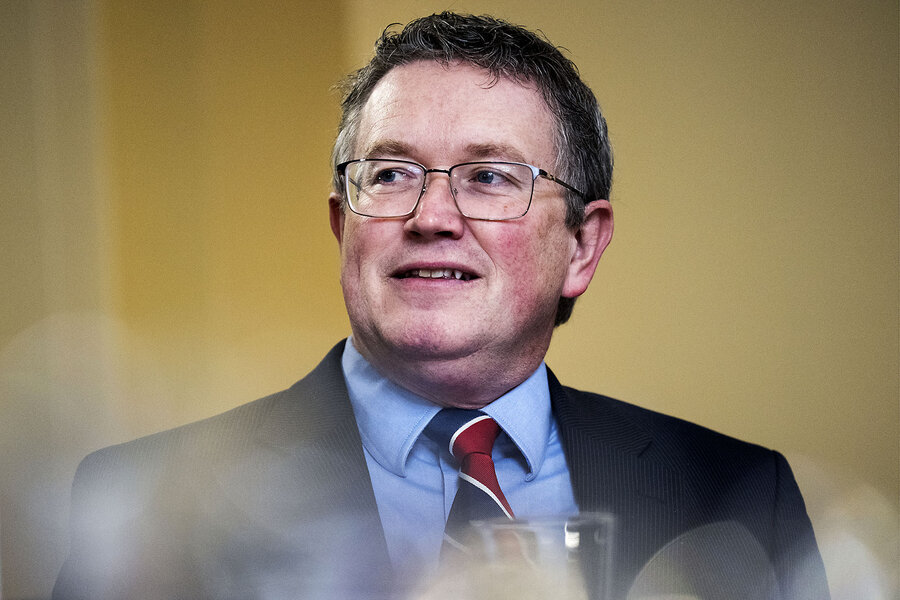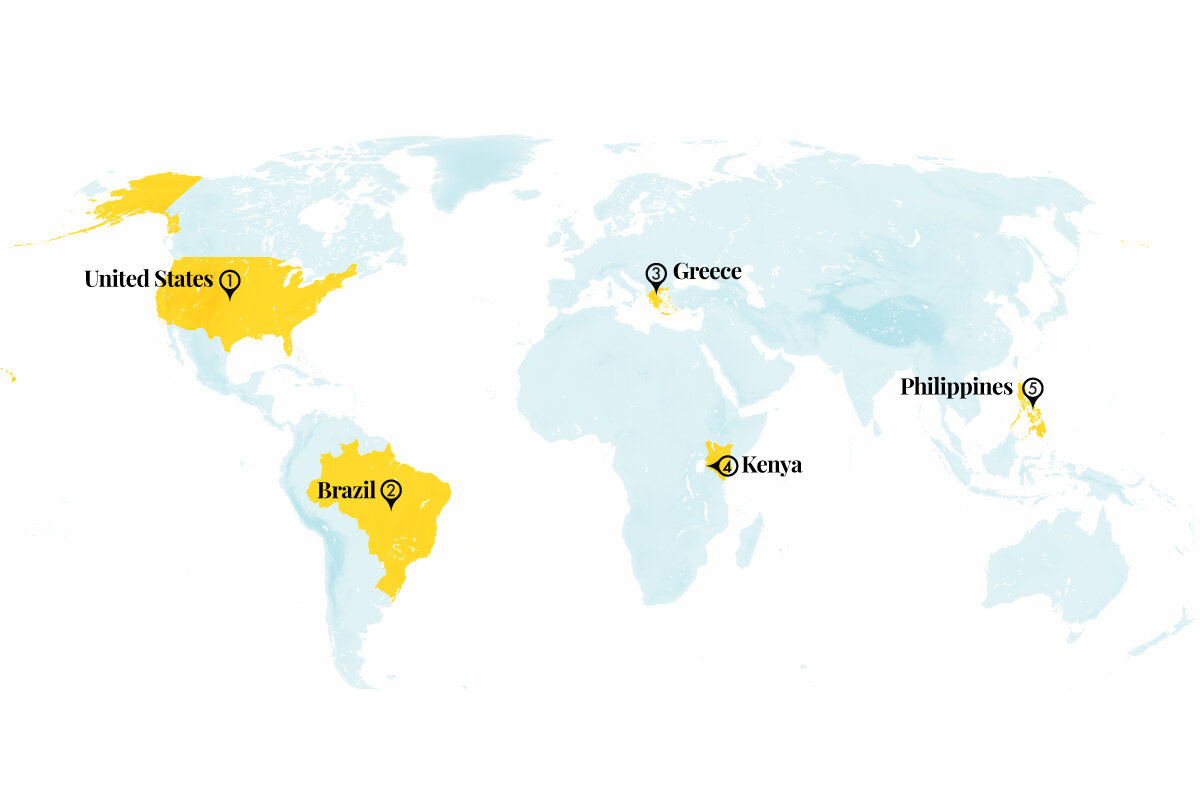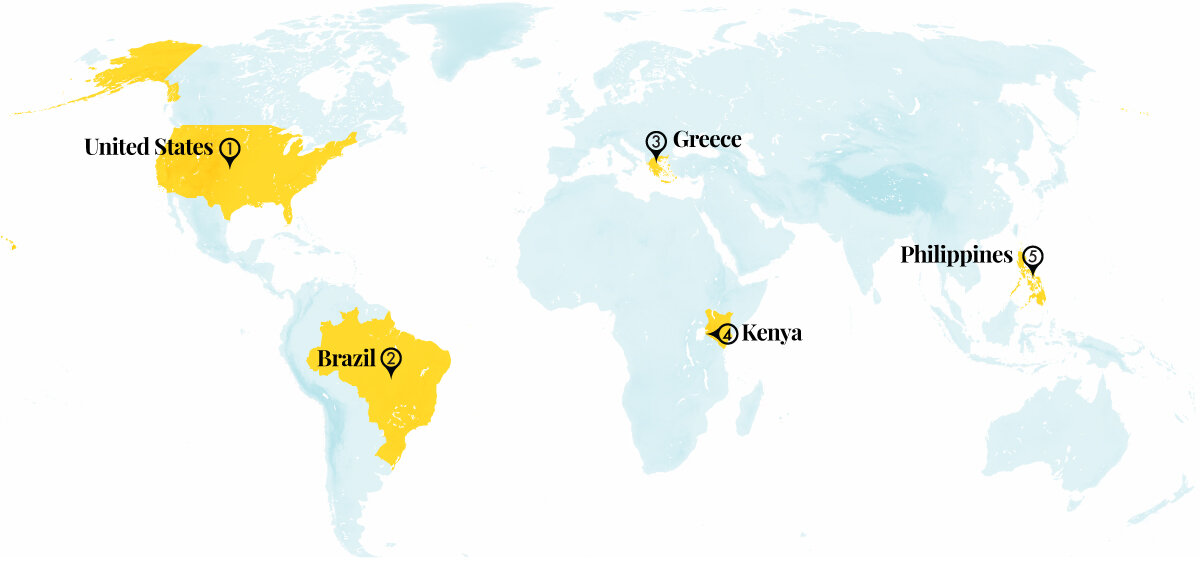- Quick Read
- Deep Read ( 6 Min. )
In Today’s Issue
- Ramadan peace prevails in Jerusalem as all sides keep extremists at bay
- Today’s news briefs
- Speaker Johnson is keeping a rowdy GOP in line
- Why Spain is trusting trans teens on their gender
- Viktor Orbán acts in West as Moscow’s man on the inside
- He skipped college and didn’t regret it
- An app for native languages, women in leading roles
Monitor Daily Podcast
- Follow us:
- Apple Podcasts
- Spotify
- RSS Feed
- Download
TODAY’S INTRO
Mr. Speaker’s rookie report card
Christa Case Bryant, the Monitor’s senior congressional correspondent, doesn’t bite on easy narratives – those binary ones that become red/blue fealty tests.
Days after Mike Johnson became House speaker last October, Christa joined our podcast to talk about laying out sharply different perspectives without amplifying them, instead sifting evidence of words and deeds.
“We shouldn’t be surprised that it’s hard to get it right in the first week of the first month,” Christa said then. “We as journalists will be doing that in the weeks and months to come.”
Speaker Johnson has been learning by layers, too. Today, Christa takes stock of how he’s doing. Ukraine wants aid. Washington needs funding. The stakes are high.
Share this article
Link copied.

Help fund Monitor journalism for $11/ month
Already a subscriber? Login

Monitor journalism changes lives because we open that too-small box that most people think they live in. We believe news can and should expand a sense of identity and possibility beyond narrow conventional expectations.
Our work isn't possible without your support.
Ramadan peace prevails in Jerusalem as all sides keep extremists at bay
Tension is common at Jerusalem’s Al-Aqsa Mosque, a space for worship that can be jolted by extremists. What’s the climate now, during Ramadan, with nearby Gaza inflamed? So far, so good. Our reporter tells why.

Al-Aqsa Mosque, located in a Jerusalem compound revered by both Muslims and Jews, has at times been a flashpoint linked to the ups and downs of the Israeli-Palestinian conflict.
Yet as war rages in Gaza and violence flares across the West Bank, one of Jerusalem’s most contested holy sites is, for now, a rare oasis of calm. Proof, some say, that close security coordination – and allowing Islamic site officials to manage their own affairs – can facilitate peaceful prayers.
Jordanian, Palestinian, and Israeli officials are mindful of what happened last year, when coordinated measures to maintain the peace during the confluence of Ramadan, Passover, and Easter ultimately broke down.
Yet amid warnings this year about potential clashes, and concerns about instigators from Israel’s far right and Hamas, visitors observing the second week of Ramadan at Al-Aqsa are praying, fasting, and celebrating peacefully.
Jerusalemites say this is the way it should be.
“We don’t want trouble; we are not looking for violence. All we want is to practice our religion peacefully without restrictions,” says Umm Hazem, a mother of four, awaiting sunset prayers. “When we are given a chance and are not harassed and attacked by Israeli extremists, we choose to be peaceful.”
Ramadan peace prevails in Jerusalem as all sides keep extremists at bay
As war rages in Gaza and violence flares across the West Bank, one of Jerusalem’s most contested holy sites is, for now, a rare oasis of calm.
Amid warnings from governments and Islamic authorities about potential clashes, and concerns about instigators from Israel’s far right and Hamas, visitors observing the second week of Ramadan at Al-Aqsa Mosque, one of Islam’s three holiest sites, are praying, fasting, and celebrating peacefully.
One could almost describe it as normal. Jerusalemites say this is the way it should be.
“We don’t want trouble; we are not looking for violence. All we want is to practice our religion peacefully without restrictions,” says Umm Hazem, a mother of four, as she sat in an Al-Aqsa courtyard, awaiting sunset prayers.
“When we are given a chance and are not harassed and attacked by Israeli extremists, we choose to be peaceful.”
Jordanian, Palestinian, and Israeli officials are mindful of what happened last year, when coordinated measures to maintain the peace during the confluence of Ramadan, Passover, and Easter ultimately broke down, leading to violent clashes and the entry of Israeli security forces into Al-Aqsa, damaging the mosque's interior.
Al-Aqsa, located in a compound revered by Muslims as Haram Sharif, the Noble Sanctuary, and by Jews as the Temple Mount, has at times been a flashpoint linked to the ups and downs of the Israeli-Palestinian conflict.
Yet the calm, even amid the devastating war in Gaza, is serving as proof that close security coordination – and allowing Islamic site officials to manage their own affairs – can facilitate peaceful prayers.

Worshippers, when unobstructed, simply want to pray, they say.
Hard compromises
Underpinning this Ramadan calm is a security arrangement proposed by Jordan, Jerusalem’s Islamic Waqf authority, and the United States that was coordinated and hashed out with the Israeli police in January, according to Jordanian and Waqf sources.
The coordination is subject to internal compromises on both sides, including, according to Israeli media, a decision by Israeli Prime Minister Benjamin Netanyahu to suppress inflammatory demands from his hard-right national security minister, Itamar Ben-Gvir. The resulting access to Al-Aqsa falls short of what the Waqf would have preferred.
Restrictions imposed by Israel on Palestinians in the West Bank have meant that for six days of the week, only Muslims in Israel can come to Al-Aqsa this Ramadan. And on Fridays, only a few thousand of those over of the age of 55 are allowed in from the West Bank to pray.
Al-Aqsa, revered by 1 billion Muslims, can be reached for much of this Ramadan by just tens of thousands of Muslims in Israel.
A key to the overall arrangement has been that the Waqf has dramatically increased its staff and security this holy month from 600 to 1,000 people, the most ever, and has enlisted dozens of local volunteers, the Waqf says.
While Palestinian security staff members patrol each corner of the grounds and the entrances to the mosques, shrines, and library, Jerusalem youths, known to their community and the Israeli police, act as plainclothes sentries to prevent provocations from either side.

On a visit to the compound Tuesday, Waqf security staff politely asked worshippers to check their bags, muttering into walkie-talkies as groups filed past.
One guard half-joked that they had direct orders to “break the arm of anyone who tries to throw a stone.”
“We are keeping the peace in order to protect Al-Aqsa,” says a guard, declining to be named. “We are protecting the site from being abused from troublemakers but also from being stormed by far-right settlers and the Israeli police. We don’t want to give them the excuse.”
The results: no political gatherings or rallies this Ramadan; no Hamas chants or flag-waving in Al-Aqsa – as happened during the 2021 Israel-Hamas war; and no one heeding Hamas’ multiple calls for Palestinians to “mobilize” and “march” on Al-Aqsa.
In Friday sermons, imams have warned the faithful against responding to far-right Israeli “extremists” and “terrorists” wishing to goad them into violence.
People are simply coming to pray; many are praying for peace.
“This Ramadan has been calm, despite the intense pressures and tensions. People are able to come, pray, break their fast, and observe the holiday, which is all they want,” says Sheikh Azzam Khatib, director of the Jerusalem Waqf.
“God willing, it will stay calm for all of Ramadan. This is what we are working so hard for. This is what we pray for.”
Four different Israeli security agencies are patrolling the outer compound entrances. Border police with semi-automatics patrolled as if in a war zone.
Under their gaze, thousands of prayergoers entered peacefully.

Monitor reporters witnessed multiple instances in which disputes arose over the entry of certain individuals, in which the Israeli police stopped them and then referred them to Waqf staff just past the door – ceding the matter to the Islamic authority.
Yet the potential for flare-ups still bubbles beneath the surface.
The right-wing Mr. Ben-Gvir is pushing for even more restrictions on Muslim prayergoers, and this week demanded that Jews have access to Al-Aqsa during the final 10 days of Ramadan (beginning this year at the very end of March) – the holiest days of the month.
That would break a precedent under which non-Muslim visitors are only permitted to enter Haram Sharif between early morning and noon Muslim prayers for the first 20 days of Ramadan.
The entrance of far-right Israeli groups accompanied by large security details during the final 10 days – when the compound is at its fullest, night and day – would likely lead to clashes, Waqf officials warn.
“If the extremists attack Al-Aqsa at this time of tensions,” Sheikh Khatib cautions, “there will be blood in Jerusalem.”
Family affair
On Tuesday, the ninth day of Ramadan, amid freezing, wind-driven rain, several hundred prayergoers huddled inside the Qibleh Mosque, the main prayer structure at Al-Aqsa.
The calm offered a rare respite, Jerusalemites said.

As older men sat and read the Quran between prayer times, children rolled, somersaulted, and played tag.
“I no longer let my sons out after 3 p.m.; Jerusalem is no longer safe if you are a Palestinian teenager,” says Mohammed, a taxi driver, while placing bags of food and a pillow on the floor. His three sons sat in another corner with their friends.
“This is the one chance for us to go out as a family, to be ourselves in a safe space,” he says, adding he was “praying for peace and a return to normalcy.”
As sunset neared, hundreds gathered to break the fast like one giant family on the mosque carpet – dates and yogurt placed on long plastic runners.
It was only during the iftar meal that the topic of Gaza came up.
As volunteers handed out takeout containers with shredded shawarma, grilled chicken, and rice, one prayergoer plopped his meal demonstrably in the center of the plastic runner.
“I wish we could give all this to Gaza!” he declared, pointing to the food. The faithful nodded in agreement. “We all wish we could,” said another.
“There is only one thing we can do as Palestinians of Jerusalem,” said a third, his voice wary. “Pray. And remain.”

Today’s news briefs
• New auto emissions rules: Federal standards relax initial tailpipe limits proposed last year, but eventually reach nearly the same strict standards set out by the Environmental Protection Agency.
• Apple faces antitrust suit: The tech firm says the Justice Department’s lawsuit accusing it of engineering an illegal monopoly on smartphones in the United States is “wrong on the facts and the law.”
• Reddit goes public: The initial public offering, with trading beginning March 21, will test the company’s ability to overcome a nearly 20-year history colored by losses, management turmoil, and occasional user backlashes.
• Alabama bill targets DEI: Legislation signed by Gov. Kay Ivey would ban diversity, equity, and inclusion programs at public schools, universities, and state agencies.
• South Africa confronts water crisis: Thousands of people line up for water as the country’s largest city, Johannesburg, faces an unprecedented collapse of its water system.

Speaker Johnson is keeping a rowdy GOP in line
The House speakership has always been a prime post of power. Now, due to Republicans’ slim majority and battles within their ranks, Speaker Mike Johnson’s job is also riding a vortex.

- Quick Read
- Deep Read ( 8 Min. )
It’s hard to overstate how steep Mike Johnson’s learning curve has been since taking over as speaker of the House five months ago.
“When you’re in uncharted waters, as we are – dark skies on the horizon and all that – you have to know where the fixed points on the horizon are,” said the Louisiana conservative. That means sticking to what he calls America’s foundational principles, from fiscal responsibility to “peace through strength.”
Speaker Johnson’s ability to keep the ship – whether it’s his speakership, the Republican Party, or Congress itself – from running aground was put to its biggest test yet this week. A 1,012-page bill with $1.2 trillion in government funding had to pass both the House and Senate before 12:01 a.m. on Saturday, or much of the government would shut down.
Mr. Johnson, who needed two-thirds of the chamber’s support for the bill, narrowly cleared that hurdle thanks to nearly all Democrats and about half of Republicans voting in favor. The passage marks a substantial achievement for the rookie speaker, who has so far managed to hold his fractured party together even as discontent simmers. Supporters credit his calm disposition and willingness to listen.
“I’m hard-pressed to see who could do it better,” says Doug Heye, a former GOP leadership aide.
Speaker Johnson is keeping a rowdy GOP in line
If Americans were asked to pick the Speaker of the House out of a lineup, few would likely point to the short man in horn-rimmed glasses staring at the floor and pursing his lips.
Even Mike Johnson himself sometimes looks as if he can’t quite believe he’s the most powerful politician in the U.S. House of Representatives. When preparing to brief reporters, he can often be seen taking a deep breath, lifting his chin, and putting on a dignified expression – as he did Wednesday, when House GOP leadership gathered for a press conference ahead of yet another potential government shutdown.
Asked to expound upon his first five months on the job, the Louisianan chose a hurricane metaphor.
“When you’re in choppy seas, when you’re in uncharted waters, as we are – dark skies on the horizon and all that – you have to know where the fixed points on the horizon are,” he said. That means sticking to what he calls America’s foundational principles, from fiscal responsibility to “peace through strength.”
Speaker Johnson’s ability to keep the ship – whether it’s his speakership, the Republican Party, or Congress itself – from running aground was put to its biggest test yet this week. A 1,012-page bill with $1.2 trillion in government funding had to pass both the House and Senate before 12:01 a.m. on Saturday, or much of the government would shut down.
Mr. Johnson, who needed two-thirds of the chamber’s support for the bill, narrowly cleared that hurdle thanks to nearly all Democrats and about half of Republicans voting in favor. The 286-134 passage marks a substantial achievement for the rookie speaker, who has managed to hold his fractured party together even as discontent simmers beneath the surface.
GOP Rep. Marjorie Taylor Greene of Georgia, who had urged the speaker not to bring a bill supported by far more Democrats than Republicans, filed a “motion to vacate” the speaker’s chair on Friday morning. However, with Congress headed for a two-week break and Ms. Greene telling press it was “more of a warning,” an ouster of Mr. Johnson does not currently appear imminent.
He has already reluctantly approved four stopgap spending measures, three more than the one that triggered his predecessor’s removal. His party’s majority is down to a two-vote margin, and that’s about to narrow further; on Friday Wisconsin GOP Rep. Mike Gallagher announced he intends to leave Congress next month. Meanwhile, the national debt is growing by nearly $100,000 a second, and the right has been demanding cuts.
In some ways, the new speaker had little room to maneuver – but neither did his rebel flank. With Democrats controlling the Senate and White House, Mr. Johnson had to compromise. And while that rankled hardline Republicans, even they have shown little appetite for a shutdown, or for a repeat of the weeks-long crisis that ensued after they abruptly ousted former Speaker Kevin McCarthy.
Still, there is no guarantee that the untested Mr. Johnson can continue to keep things from going off the rails. For now, supporters credit the new speaker’s calm disposition and willingness to listen.
“I’m hard pressed to see who could do it better,” says Doug Heye, a former GOP leadership aide.
Veteran Rep. Tom Cole of Oklahoma, who chairs the influential Rules committee, goes further. Given the circumstances, he says, Speaker Johnson is doing remarkably well.
“I’m very proud of what he’s been able to do,” says Chairman Cole. “He’s in a more secure position than most people seem to think.”

Learning on the job
It’s hard to overstate how steep Mike Johnson’s learning curve has been.
“He went from moving at 5 m.p.h. to 100 m.p.h. very, very quickly,” says a one-time aide to former GOP Speaker John Boehner. While rank-and-file members of Congress may face a handful of consequential decisions over the course of a term, the speaker faces numerous ones every day – with constant scrutiny not only from the press but from fellow members.
A key question has been how to handle a group of about 20 conservatives, mostly but not entirely from the House Freedom Caucus, who have pushed hard to rein in spending and change the way the House does business.
They have repeatedly engaged in what GOP Rep. Thomas Massie of Kentucky, once considered among the most rebellious of House Republicans, dubs “procedural violence” to stymie their own party leaders.
Former Speaker McCarthy, whose prodigious fundraising and indefatigable stumping for GOP candidates helped his party win back the House in 2022, arguably had more leverage over his caucus, including the ability to make committee appointments. Mr. Johnson, who took over in October has had fewer bargaining chips.
“He doesn’t have carrots or sticks,” says Representative Massie. “It’s like having a substitute teacher and the class figuring out they can kind of push the teacher around.”
Democrats say the House under Mr. Johnson’s leadership has been “a mess” and “much more chaotic” than under Mr. McCarthy – a state of affairs that has greatly reduced the chamber’s ability to pass legislation on behalf of Americans around the country. As of January, this two-year Congress was on track to pass the fewest number of bills since the Great Depression.
“They are so busy fighting with themselves, aligning with the most extreme members of their conference, that the American people are left out of the picture,” says Democratic Whip Katherine Clark of Massachusetts.
The frustration over budgets
For years, conservatives have been unhappy about the budget process, which members on both sides of the aisle agree has broken down. One big sticking point has been the reliance on stop-gap funding measures, which continue funding the government temporarily at previously agreed levels – in this fiscal year, that means levels set by the previous Democratic majority. A second is the last-minute cramming of multiple appropriation bills into a single larger bill, called an omnibus or minibus. A third is failure to allow sufficient opportunity to review or amend spending bills.
A key rule change conservatives won last year was restoring the 72-hour review period for legislation – a rule Speaker Johnson waived in order to pass the funding package by Friday at midnight, since the text was only released at 3 a.m. on Thursday.
This “minibus” includes funding for the departments of Labor, Education, Treasury, and Homeland Security. The last proved the thorniest in negotiations, as border security and immigration has become the No. 1 election issue. Among the provisions are a 25% increase in border technology spending and half a billion dollars to hire 22,000 more Border Patrol agents, as well as 12,000 special visas to bring Afghan former interpreters for the U.S. military and their families to the U.S.

Speaker Johnson shares many conservative principles with the Freedom Caucus. But he has taken issue with their tactics. And he appears to have concluded that he doesn’t need their support to get this funding passed. Before Ms. Greene filed her resolution Friday morning, there had not been any serious talk of a move to oust him by bringing a “motion to vacate” the speaker’s chair, as Rep. Matt Gaetz did with Mr. McCarthy.
A listener who can also be unbending
Observers say that goes to show that the real issue with Mr. McCarthy was personal; Mr. Johnson, by contrast, is generally well-liked and trusted.
“He doesn’t act like the smartest person in the room,” says GOP Budget committee chair Jodey Arrington of Texas, a friend. “But his mind, his character, and his leadership qualities are huge.” Foundational to his approach, adds Mr. Arrington, is the speaker’s deep Christian faith and a sense of peace and purpose derived from feeling called to take on this role.
Democrats credit Mr. Johnson for his civility, but they express deep concerns about the extent to which he – a constitutional lawyer who earlier in his career advocated against abortion and same-sex marriage – brings his religious views into his work in Congress. Others describe him as unbending in his views.
“He has a gentility to him, but he also has a rigid perspective on history,” says Rep. Deborah Ross, a North Carolina Democrat who served with him on the Judiciary subcommittee on the Constitution and said they couldn’t have been further apart on the issue of voting rights.
Among conservatives, the criticism is not personal but focused on negotiating tactics and procedure.
“We could have fought harder to achieve the objectives we set out to achieve,” says Rep. Chip Roy of Texas, a Freedom Caucus leader, who nevertheless calls the speaker “a good man, a good friend.”
One huge missed opportunity, says Mr. Massie, was not leveraging a provision Mr. McCarthy had secured in a deal he struck with the White House last summer, which would cut the budget by 1% if a funding deal wasn’t agreed to by April 30. That would have enabled the GOP to negotiate with Democrats not against the threat of a shutdown – which can be politically detrimental – but against the threat of a 1% cut that passed into law with strong Democratic support.
Up next: U.S. role in global security
The pressure won’t let up anytime soon. Now that Mr. Johnson got the budget passed – albeit nearly halfway through the fiscal year – his next challenge will be figuring out what to do about aid to Ukraine, Israel, and Taiwan, which President Joe Biden requested as a package last fall. To many lawmakers, it’s an existential security issue –and one he should be willing to take a stand for even if it costs him his job.
“I’m imploring him to be decent and honest and do the right thing for funding our government and protecting democracies around the world,” says Democratic Rep. Chrissy Houlahan of Pennsylvania, who served with Mr. Johnson on the Armed Services committee. “I know him to have a good character, and I believe that he should be the speaker for all of us and not just the speaker for the Republican Party.”
Multiple Democrats interviewed for this story said he didn’t appear interested in listening to them or their party. But Rep. Robert Aderholt, an Alabama freshman who chairs one of the Appropriations subcommittees, says when he has brought concerns to Mr. Johnson, the speaker is always ready to listen.
“He’s never been dismissive,” says Representative Aderholt, adding that the concerns he voiced about one appropriations bill were ultimately resolved. However, Mr. Aderholt voted against the $1.2 trillion bill, criticizing Senate Democrats for filling it with “woke easter eggs.”
“The best speaker is a good listener, and Mike Johnson definitely has that ability,” the former Boehner aide says, adding: “I think this could have gone sideways in any number of ways.”
Editor’s note: This story was updated midday Friday to reflect the vote in the House of Representatives on a $1.2 trillion spending bill.

Why Spain is trusting trans teens on their gender
In some U.S. states, changing one’s gender identity is seen as too weighty a decision for those under the age of 18. But Spain has taken a different approach, based on trusting transgender teens’ choices.

- Quick Read
- Deep Read ( 6 Min. )
Tragedies like the recent death of high schooler Nex Benedict in Oklahoma have drawn fresh attention to the rights and experiences of transgender teens. Some jurisdictions, including a number of U.S. states, are tightening laws against changing gender identity. But in Spain, the desire to protect youth has produced the opposite response.
Last year, the country adopted legislation allowing anyone age 12 or over to change their legal status to match their gender identity (though those under 17 would need judicial or parental consent). It’s the latest step in a radical shift in how Spain perceives its transgender community, particularly trans youth.
“Ten years ago, trans people were seen as sick people in Spain,” says Aingeru Mayor, who wrote a book about parents with trans children. “But children do not generate the same rejection that adult trans people generated. They appeal to society’s instinct to care for its cubs.”
“It’s not that we parents are extra progressive,” says Jokin Zurutuza, the father of a transgender teen. “No, we are normal moms and dads. ... But more than that, we have to be loving people to our children and love has to be above all else.”
Why Spain is trusting trans teens on their gender
Dictator Gen. Francisco Franco’s rule was a grim era for Spain’s transgender community.
“At the time, a trans person could be taken from the streets to prison, without any chance to consult a lawyer, and be kept there for as long as a judge saw fit,” recalls Mar Cambrollé, who has been fighting for trans rights since General Franco died in 1975, and now is president of the transgender rights association Federación Plataforma Trans.
A Franco mindset no longer shapes Spain’s view of gender identity. Just in the last 20 years, the country has undergone a radical shift in how it perceives its transgender community, particularly trans youth. Last year, the country adopted legislation allowing anyone age 12 or over to change their legal status to match their gender identity (though those under 17 would need judicial or parental consent, depending on their age).
Tragedies like the recent death of high schooler Nex Benedict in Oklahoma have drawn fresh attention to the rights and experiences of trans teens. Some jurisdictions, including a number of U.S. states, are tightening laws against changing gender identity. But in Spain, the desire to protect youth has produced the opposite response.
“Ten years ago, trans people were seen as sick people in Spain,” says Aingeru Mayor, author of the book “Transitos,” which draws on the testimonies of parents with trans children. “But children do not generate the same rejection that adult trans people generated. They appeal to society’s instinct to care for its cubs.”
And now across Europe, there is broad acceptance of trans people in society – including allowing them to change their legal status to match their gender identity, which 62% of Europeans support, according to Eurobarometer data published in December.
“Some European countries, which have been historic leaders on LGBT rights like same-sex marriage, are recognizing that trans people have been excluded from some of the advances that have occurred in the last two decades,” says Cristian González Cabrera, a senior researcher at Human Rights Watch. “These populations have unique needs, and there is a shift to be increasingly inclusive and intersectional and finally address the historical debt that many countries have to this historically marginalized group.”
“The law was a miracle”
Ivan, who was assigned female at birth, resented wearing pretty dresses to weddings as a child. As a teen, he wore makeup and feminine attire, but felt like he was role-playing. He cringed when called by his birth name.
But by chance in 2020 while getting a COVID-19 vaccine, someone referred to him using a masculine pronoun. That moment felt fantastic. “I liked it so much, I had to ask myself why,” he says.
So when Spain’s new law on gender self-identification came into effect, Ivan – then 16 years old – wasted no time setting up an appointment to change his information in the Spanish civil registry. Ivan, whose last name is being withheld, valued being able to start the process discreetly, without looping in his parents – although in the end his mother accompanied him to formally present the request.
“The law was a miracle, to be honest,” says Ivan. “It struck me as positive that young people who are not emancipated can start the process on the own. There are cases of parents kicking out their children because they are trans.”
Making the change at 16, rather than 18, meant the opportunity to earn a high school diploma that aligned with his sense of self. “Once I came out, I had no more doubts,” he shares on a WhatsApp call taken during a break from studying chemistry in the region of Galicia.
Just a month after the law went into effect, Ivan had shared his identity at home and at school. It went smoothly. Only one of his brothers struggled initially with Ivan’s identity and new name – thinking the change may have been a passing phase inspired by TikTok.
Going to an association to support the families of trans youth helped allay his parents’ nerves around the health consequences of hormonal treatment. “It seems to be a recent thing that people can talk about it,” he says. “Before maybe you got killed or a beating. Now there is more protection or support, so more people dare to come out.”

“A reality that you couldn’t even imagine”
An outcome like Ivan’s would have been inconceivable even a decade ago: Until 2013, the concept of a trans child was virtually unheard of in Spain.
That changed in large part because the work of the country’s first association for families with trans children and adolescents, Chrysallis. The organization provided vital support to trans youth at a time when the knowledge of psychologists, psychiatrists, and social workers on trans identities was still anchored on the concept of it being a pathology.
“It was a reality that you couldn’t even imagine until then – it seemed like trans people didn’t have a childhood, that they just came out in adulthood,” says Bea Sever, president of Naizen, the Basque and Navarre Association of Families with Trans Minors. “However, if you listen to their story, you’ll realize that they all tell you, ‘I knew it since I was a little, even though I didn’t know how to put words to it.’”
Some of these families shared their stories with the public, helping others to come to terms with the reality they were facing. “In Spain, there are more and more families that can accompany their sons, their daughters, because they know that what their sons and daughters are expressing is possible,” says Mr. Mayor, the author.
Experts say that such activism was crucial for paving the way to Spain’s gender self-identification law. They also point to the prominence in recent years of various trans personalities in music, film, and television for helping familiarize society with their struggles.
A different outcome
In the end, the self-identification law passed with a firm majority. Though there was acrimonious debate over the law, it played between the left-wing parties, says Javier Corral Diaz, a journalist who wrote his thesis about its reverberations on social media. Anti-trans feminists raised concerns that trans rights gains could come at the expense of women. “The core of the debate revolved around whether sex is a cultural construct or something truly natural,” he says.
But the right and far-right parties kept relatively quiet. Mr. Corral suggests that may be a sign of progress in a country where social mores were once shaped primarily by the Catholic Church.
That’s not to say there hasn’t been pushback. While the national government and many regional governments may enable young trans people to legally express their identities, a few regions do not have laws recognizing such trans rights. These regions still do have to recognize the genders recorded in the national registry. But their lack of such legislation – or in the case of Madrid’s regional government, their repeal of trans rights laws in December – indicates there is still a conservative backlash against gender identity laws.
Still, the rise of associations helping families of trans children has helped society to see trans people in a kinder light.
“It is never the parents who want their children to be the sex they don’t appear to be or another sex,” says Jokin Zurutuza, the father of a 13-year-old girl. She was assigned male at birth, but socially transitioned at age 9 with the support of her parents and school.
“It’s not that we parents are extra progressive parents who like these things,” he adds. “No, we are normal moms and dads and we want our son to be a son and our daughter to be a daughter. But more than that, we have to be loving people to our children and love has to be above all else.”
Editor's note: The story has been updated to give Mr. Corral's full name, and to classify Galicia as a region.

Patterns
Viktor Orbán acts in West as Moscow’s man on the inside
Hungary is a member of NATO and of the EU, but Prime Minister Viktor Orbán is closer to Vladimir Putin. Will his predictions that the West will abandon Ukraine prove true?

- Quick Read
- Deep Read ( 4 Min. )
Hungarian Prime Minister Viktor Orbán makes no secret of the fact that although his country is a member of the European Union and of NATO, his closest international friends are Russian President Vladimir Putin and Donald Trump.
And lately he has been taking a starring role in what – to the Biden administration, key European allies, and an invasion-battered Ukraine – looks unsettlingly like the trailer for a geopolitical horror movie.
Its plotline? Mr. Trump wins the U.S. election and cuts off all aid to Ukraine, tipping the balance in Russia’s favor. Europe cannot fill the funding gap. And Moscow is emboldened to peel off, Ukraine-style, pro-Russian enclaves in nearby Georgia and Moldova, and then threaten NATO’s eastern flank.
Such a scenario would be even more likely if right-wing populists such as Mr. Orbán fare as well as they are expected to in June’s European Parliament elections.
Ahead of a meeting on Thursday of EU leaders, European Council President Charles Michel said more military aid was needed and that it was time to “put the EU’s economy on a war footing.”
Not least because of something Mr. Orbán said last week: “If the Americans don’t give any money or weapons, the Europeans won’t be able to fund this war on their own.”
Viktor Orbán acts in West as Moscow’s man on the inside

His central European country is barely the size of Maine. Its 10 million people represent a tiny fraction of the Continent’s population.
Yet Hungarian Prime Minister Viktor Orbán has taken a starring role in what – to the Biden administration, key European allies, and an invasion-battered Ukraine – looks unsettlingly like the trailer for a geopolitical horror movie.
The putative plotline:
- A returning President Donald Trump ends all aid to Ukraine, tilting the military balance dramatically in favor of the Russian invaders.
- Ukraine’s European backers in the trans-Atlantic NATO alliance fail to fill the gap.
- The Kremlin is emboldened to peel off, Ukraine-style, pro-Russian enclaves in nearby Georgia and Moldova, and then threaten NATO’s own eastern flank – Poland; the once-Soviet Baltic states of Lithuania, Latvia, and Estonia; and Finland and Sweden.
Sounds unthinkable?
European countries are taking it seriously, especially those nearest to Russia. And Mr. Orbán has sharpened their concerns in the past few weeks.
The Hungarian leader’s outsize role in the political drama is largely down to the company he keeps.
Although Hungary is a member of NATO, Mr. Orbán’s closest international friends are Russian President Vladimir Putin and Mr. Trump, no fans of the Western alliance.
The Hungarian leader has become something of a Trump-and-Putin whisperer. And earlier this month, after meeting Mr. Trump in Florida, he spelled out what the former president meant when he said last year that if reelected, he would “have that war settled within one day – 24 hours.”
“He will not give a single penny for the Russian-Ukrainian war,” Mr. Orbán said. “That’s why the war will end, because it’s obvious that Ukraine can’t stand on its own feet.”

European leaders are hoping the Ukraine horror movie never gets made, because either Mr. Trump fails to regain the White House or, if he does, he pulls back from his campaign rhetoric.
But a major speech by Mr. Orbán last week, on his return from the United States, underscored the urgency of Europe’s efforts to ramp up support for Ukraine.
Addressing a crowd on Hungary’s national day, he made it clear that he hoped for and expected a Trump win in November. He also predicted that fellow right-wing populists will make major gains in June’s elections for the Parliament of the 27-nation EU.
“We started this year alone. By the end of it, we’ll be the majority in the world!” he proclaimed.
Mr. Orbán has long been a thorn in the side of NATO and the EU.
At home, he has weakened the independent judiciary, constrained the media, and limited rights of LGBTQ+ people and other minority groups. Abroad, he has undermined moves to isolate Russia. He has met Mr. Putin, dispatched his foreign minister to Moscow a half-dozen times, and barred military equipment for Ukraine from crossing Hungarian territory.
So far, his increasingly frustrated partners have found work-arounds.
NATO set up a Ukraine commission that includes every member state except Hungary. The EU has managed to frustrate Mr. Orbán’s bid to block Ukraine’s path to EU membership and European funding for Kyiv.
But that has required the cooperation of Italian Prime Minister Giorgia Meloni, an ideological ally of Mr. Orbán’s who nonetheless firmly backs Ukraine. It is unclear whether she would hold firm if Americans elect Mr. Trump, with whom she also has close ties.
And with the latest U.S. support package for Ukraine held up in Congress, Mr. Orbán’s prediction of a far-right surge in the EU has lent new impetus to moves to boost European support for Ukraine.

Last week, the Continent’s two major players, France and Germany, held a summit to begin repairing a Franco-German rift on Ukraine that has complicated the supply of arms to Kyiv.
While Europe as a whole has provided about half the West’s assistance to Ukraine since the 2022 invasion, French President Emmanuel Macron is adamant that Europe, and Germany in particular, must supply Ukraine with more powerful weaponry.
Russia’s NATO neighbors are already upping their defense preparedness with a wary eye on a rearming Moscow.
And when the EU managed to provide Ukraine with only half of the 1 million urgently needed artillery shells it had promised, the Czech Republic enlisted NATO partners’ backing to buy hundreds of thousands outside Europe. An initial 300,000 shells could now reach Ukraine within weeks.
But ahead of a meeting on Thursday of EU leaders, European Council President Charles Michel said more military aid was needed and that it was time to “put the EU’s economy on a war footing.”
Mr. Macron, who clearly agrees, said last week that if Russia prevails in Ukraine, “Europe’s credibility is reduced to zero. Who can think Vladimir Putin will stop there?”
Still, he, like many European leaders, will be haunted by something else Mr. Orbán said after his meeting with Mr. Trump: “If the Americans don’t give any money or weapons, the Europeans won’t be able to fund this war on their own.”

He skipped college and didn’t regret it
Trust in the power of a college education is declining for one reason: It’s too expensive. One solution is lowering costs. But Cataldo Maria shows another way.
- Quick Read
- Deep Read ( 5 Min. )
Less than 10 years ago, more than half of Americans said they had a lot of confidence in their system of higher education. Today, that number is closer to a third. What has happened?
Costs have skyrocketed, leading an increasing number of Americans to ask, is it worth the money? For many, the answer is no.
Yes, data still shows that, on average, going to college helps. But “this doesn’t mean that it’s a good deal for everybody or that every college is a good deal or that every degree in every college is a good deal,” says Jeff Denning of the University of Notre Dame.
The key is finding the right fit in terms of potential career, college, and cost. And for some, that means no college at all. Cataldo Maria skipped college to go to trade school for welding and sees a credible future with a six-figure salary.
He says, “I just didn’t see it being worth four years when I could be making money now.”
He skipped college and didn’t regret it

Cataldo Maria made a choice two years ago as a high school senior that shaped the beginning of his adult life. He skipped college and went to trade school for welding.
“I never really felt any pressure to go to college,” he says of his parents. “They definitely do tell me that I’m the most cost-effective one,” Mr. Maria adds with a laugh, reflecting on his sister’s costly college journey.
For Mr. Maria, the sticker price is too high and there are no guarantees of a job afterward. His 50-year-old uncle went to college and studied abroad. He is still paying off his loans. Mr. Maria even quit trade school without a certificate. Halfway through, he felt he had enough work experience, and he hasn’t regretted it.
“I just didn’t see it being worth four years when I could be making money now,” he says.
Mr. Maria’s realization is increasingly common in the United States. From 2015 to 2023, the percentage of Americans who expressed a lot of confidence in the higher education system fell from 57% to 36%, according to a recent Gallup poll. The decrease can be seen across all ages and demographics, but it is steepest among Republicans.
Academically, the American higher education system is still routinely rated among the best – if not the best. But research shows that about 40% of students drop out within six years, and those students are more likely to default on student loans.
Mr. Maria captures America’s growing crisis of trust in higher education. As costs skyrocket, is it worth the money? For an increasing number, the answer is no.
Decades ago, college was more affordable and mainly funded by the government. “Now students and their families bear much of the burden, and that fact has changed what used to be a pretty straightforward calculation about the economic value of college into a complex math problem,” writes Paul Tough, author of “The Inequality Machine: How College Divides Us,” in The New York Times Magazine.
In researching one of his books, Mr. Tough traveled to conferences where experts said American higher education gave people the chance for economic mobility, helping lower-income families. “But a lot of the time when I would talk to individual families, they would be much more stressed,” he told a Brookings Institution panel. “They were often really concerned about the cost of college, about whether it would pay off for them and for their families.”

Finding the right fit is crucial
Not all the research is negative. Crucially, college graduates can earn significantly more during their lifetimes than those who don’t have degrees.
“On average, it seems to be that going to college is a good deal, but a lot of the ‘on average’ clause is doing some heavy lifting there,” says Jeff Denning, an economist at the University of Notre Dame in Indiana. “This doesn’t mean that it’s a good deal for everybody or that every college is a good deal or that every degree in every college is a good deal.”
What students major in and where they attend school matters. The U.S. Department of Education’s College Scorecard and net price calculators can help families calculate costs, graduation rates, financial aid, and median earnings for any school that receives federal aid, Dr. Denning notes.
“Imagine if you’re going to be a schoolteacher,” he says. Going to a state school with in-state tuition makes more sense than an expensive, selective private school, since many graduates in that line of work come out making $40,000 annually either way.
For Kailah Ross, however, college means more than just a degree. “College was the easy way out,” says the first-generation college student from West Philadelphia.
“Not only was college the smartest decision, but it was also the safest for me, because I know kids that got involved in stuff by just staying home,” Ms. Ross says. What does that bad stuff look like? “Street stuff. Early pregnancies, they got involved in stuff by just being home.”
She got a tuition scholarship to attend Benedict College in Columbia, South Carolina, which was one of 13 schools that accepted her. She took it, and after taking out $10,000 in loans for room and board for her first two years, she’s now a resident assistant in her dorm, which gives her free accommodation. She completed her first internship last summer with the Defense Logistics Agency and still works there during the school year.
A cybersecurity major, Ms. Ross wants to be an engineer. At Benedict, she is president of the golf club and on the board of her school’s chapter of the National Society of Black Engineers.
“I have created a family that I would have never known existed,” she says.

Different situations, different solutions
For Ms. Ross, American higher education has worked. The question is how to find the right fit for more people.
“We’re fixing a broken system,” U.S. Secretary of Education Miguel Cardona said at a Monitor Breakfast last fall. “Gen Z’s who attend college will probably end up with $150,000 in debt, with interest ballooning for a $40,000-a-year job. That doesn’t make sense. That’s the system we’re changing.”
To do that, Mr. Cardona says higher education has to be made more affordable. For instance, students should be made more aware of schools offering a quality education for a reasonable price. Moreover, high schools should start creating pathways to two-year and certificate programs that teach marketable skills and promise careers that make decent money. Certificates can also prepare people to attend school later in life.
Mr. Maria’s starting pay was $15 an hour. Now he makes $19 an hour, and he’ll clock over $20 an hour after his next raise. That is more than enough to cover his half of $1,300 rent for a two-bedroom apartment that he shares with a buddy. He drives a 2002 Honda Civic.
The only way he would think about getting a degree is if a company required him to have one to become a project manager.
His plan is to start his own welding business after a few years or go to work for one of the unions. Or he could become a certified welding inspector. At one career day, he met an inspector who told him he makes deep six figures without having a degree.
Meanwhile, his older sister is about to graduate from the University of Georgia with a communications degree. She might move back home if graduate school doesn’t happen. She also might have to use some of the $20,000 that their parents, both college-educated architects, saved for her brother to go to college.
“Hers is starting to run low, and they’re asking me if I mind if they borrow out of mine,” Mr. Maria says. “I’m like, ‘Well, I’m not gonna use it.’”

Points of Progress
An app for native languages, women in leading roles
In our progress roundup, we focus on equality for noncitizen writers in America, speakers of native tongues in Brazil, and Maasai women in Kenya.
An app for native languages, women in leading roles

Non-U.S. citizens are now eligible for the National Book Awards
The change expands representation in one of the United States’ highest literary accolades. Starting in the 2024 cycle, longtime residents of the United States, U.S. territories, and tribal lands will be eligible for awards in fiction, nonfiction, poetry, and young people’s literature, regardless of their immigration status. The unanimous decision by the National Book Foundation’s board is the culmination of a yearslong effort to allow more participation from immigrant authors.
In 2018, the foundation started a petition process that allowed American publishers to submit works by noncitizens. Publishers had to vouch that an author had resided in the U.S. for at least 10 years and was pursuing naturalization or had no viable pathway to do so. The updated rules mandate only that the writer “maintain their primary, long-term home” in the U.S.
The change is part of a broader trend. Last year, the Pulitzer Prize Board amended its requirements for awards in books, music, and drama to include anyone who considers the U.S. their permanent home, following an open letter signed by hundreds of writers. “We have a duty to ask what constitutes the literature of a nation,” the letter read.
Sources: Mother Jones, The New York Times
An app is helping Brazil’s Indigenous communities connect in their native languages
In this tech-savvy nation, the country’s 1.7 million Indigenous people, many of whom live in the Amazon, struggle to remain connected in writing via cellphones. Linklado offers a fix: a digital keyboard that allows Indigenous people to quickly type with letters and diacritics used to write Indigenous languages in the Latin alphabet.
Though many Indigenous languages are primarily oral, Portuguese colonizers transcribed them using the Latin alphabet in the 16th century. Launched in 2022 by Juliano Portela and Samuel Benzecry, two natives of the Amazon region, Linklado is now available for every Indigenous language in the region – about 40 in total. The app also allows nonspeakers to have their texts translated into Indigenous language for a fee, providing a valuable stream of revenue to Indigenous women, who are often left out of Brazil’s economy.
Linklado is free to use and has been downloaded about 3,000 times. The creators said that many people are still using the original test version, meaning that usage numbers are likely higher. Some Indigenous activists hope the app will help preserve Brazil’s native languages, many of which are at risk of dying out.
Source: Agence France-Presse
Greece legalizes same-sex marriage
The first Orthodox Christian country to do so, Greece joins 15 other European Union states and more than 30 nations around the world that have granted same-sex marriage rights. The law allows same-sex couples to adopt children and have full parental rights, though not in cases of surrogacy. The vote crossed party lines, with 176 members of the 300-person parliament voting in favor.

Though Greece has allowed same-sex civil unions since 2015, this legislation defies intense opposition from the Greek Orthodox Church, the socially conservative religious institution to which 80% of the country’s population belongs. Recent polls by the Pew Research Center and Metron Analysis showed that 48% and 62%, respectively, of respondents support same-sex marriage, though more than two-thirds in the latter survey opposed same-sex parenthood. Analysts say that the new law could help the center-right government gain favor from the left.
Some have leveled criticism against the law for not including any protections for transgender people. But supporters cheered outside of parliament after the vote was announced. “This isn’t just about legal recognition; it’s about validation, acceptance, and the affirmation of our inherent worth,” rights group Thessaloniki Pride said on social media.
Sources: Financial Times, Pew Research Center, The Washington Post, U.S. News & World Report
Maasai women are stepping into leading roles
Challenging stereotypes and empowering their families, women in Kenya are assuming more duties in conservancies. These lands are collectively owned and managed by Indigenous groups, which earn income from ecotourism. In the Maasai’s patriarchal society, governance of these lands has typically fallen to men. But at Mara Ripoi conservancy in Maasai Mara, in southwestern Kenya, three women sit on the reserve’s 10-person governing committee, making decisions on cattle grazing zones, finances, and employment opportunities.
Conservancies are one of Africa’s primary models for managing protected lands, about two-thirds of which lie outside of national parks. During the pandemic, the African Conservancies Fund supported around 100,000 people in the Maasai Mara, replacing tourism income while safeguarding ecosystems. Participating conservancies agreed to increase training of female park rangers and include women in leadership positions.

“Educating girls and empowering women is changing Maasailand,” said Evans Nchoe, whose wife is a local leader in Mara Ripoi. “We have a new generation of men that is closer to women than the previous one. Today, we sit down and consult. ... That is progress.”
Founded in 2023, the Mara Ripoi conservancy is one of more than 100 in Kenya and protects about 13,500 acres of land.
Sources: The Guardian, Conservation International
Farmers are relearning ancient practices to guard rice crops against climate change
The Green Revolution, which swept through The Philippines and other parts of the developing world in the latter half of the 20th century, introduced high-yield seeds that reduced hunger and poverty in many regions. But farmers who could not afford the prescribed fertilizer and pesticides were left behind.
Masipag, a farmer-led network in the Philippines, is trying to improve food sovereignty and climate resilience for smallholder farmers. Over four decades, the group has bred dozens of native rice varieties to be more resistant to drought, salt water, pests, and disease. And it’s trained over 30,000 farmers to grow them using agroecology – principles that include fewer chemicals, open access to seeds, and more humane labor conditions.
A 2018 University of British Columbia study of Masipag rice varieties grown organically found them to be more resilient to climate change than conventionally grown rice. Organic rice systems also produced social empowerment. Agroecology studies have found that the practices can increase food security, generate more income for farmers, and boost biodiversity.
Though countries such as India, Senegal, and Brazil have advanced policies favoring agroecology recently, the method faces industry pushback and existing agricultural policy. In the United States, some nonprofits such as the Traditional Native American Farmers Association have sought to promote agroecology.
Sources: Reasons To Be Cheerful, Cambridge University Press

Other headline stories we’re watching
(Get live updates throughout the day.)The Monitor's View
Sports and love bridge an Asian rift
- Quick Read
- Deep Read ( 2 Min. )
-
By the Monitor's Editorial Board
When Major League Baseball opened its season this week in South Korea, the event turned out to be about more than promoting the sport. It was a geopolitical icebreaker between two Asian neighbors long at odds over their history.
South Korean fans welcomed Shohei Ohtani, the Japanese star player of the Los Angeles Dodgers, almost like a homegrown hero. Whatever bilateral friction still exists from Japan’s colonization of Korea was greatly melted by Mr. Ohtani’s affection for South Korea, his unmatched baseball skills, and his kindness toward Korean fans.
His reception as an exemplary hero comes soon after a similar lovefest in Japan. The Japanese have fallen hard for a hit television series called “Eye Love You” that stars a charming Korean actor, Chae Jong-hyeop. The way that his character – speaking only Korean – romances the show’s Japanese female hero has led to a rush among the Japanese to learn the Korean language and adopt Korean dating styles.
The so-called soft power of countries, such as sports or TV shows, really does have the power of attraction. Whatever the past between nations, there’s always a chance for a whole new ballgame that brings people together.
Sports and love bridge an Asian rift

When Major League Baseball opened its season this week with a two-game series in South Korea, the event turned out to be about more than promoting the sport. It was a geopolitical icebreaker between two Asian neighbors long at odds over their history.
South Korean fans welcomed Shohei Ohtani, the Japanese star player of the Los Angeles Dodgers, almost like a homegrown hero. Some called him “the perfect person.” Whatever bilateral friction still exists from Japan’s colonization of Korea was greatly melted by Mr. Ohtani’s affection for South Korea, his unmatched baseball skills, and his kindness toward Korean fans.
His reception as an exemplary hero comes soon after a similar lovefest in Japan. The Japanese have fallen hard for a hit television series called “Eye Love You” that stars a charming Korean actor, Chae Jong-hyeop. The way that his character – speaking only Korean – romances the show’s Japanese female hero has led to a rush among the Japanese to learn the Korean language and adopt Korean dating styles.
These two universals – love and baseball – have perhaps now done as much to heal ties between Japan and South Korea as years of careful diplomacy by the United States and courageous leadership by some politicians. Just five years ago, bilateral ties were so low over how to deal with Japan’s 1910-1945 occupation of the Korean Peninsula that Koreans were boycotting Japanese products. In both countries, nationalist politicians have exploited the past to the detriment of reconciliation that would allow the two democracies to work closely against threats from North Korea and China.
In recent years, polls show a rising likability between the Japanese and South Koreans, especially among young people who readily embrace the other country’s cultural exports. A majority of young Koreans under age 29 also support the efforts of the current president, Yoon Suk Yeo, to improve ties with Japan.
Earlier this month, President Yoon said that the closer ties have helped deter North Korea. “Now, South Korea and Japan are working together to overcome the painful past and moving toward a ‘new world,’” he said. “The security cooperation between the two countries against North Korea’s nuclear and missile threats has been strengthened further.” The two countries, for example, now share information on North Korea’s actions in real time.
The so-called soft power of countries, such as sports or TV shows, really does have the power of attraction. Whatever the past between nations, there’s always a chance for a whole new ballgame that brings people together.

A Christian Science Perspective
Each weekday, the Monitor includes one clearly labeled religious article offering spiritual insight on contemporary issues, including the news. The publication – in its various forms – is produced for anyone who cares about the progress of the human endeavor around the world and seeks news reported with compassion, intelligence, and an essentially constructive lens. For many, that caring has religious roots. For many, it does not. The Monitor has always embraced both audiences. The Monitor is owned by a church – The First Church of Christ, Scientist, in Boston – whose founder was concerned with both the state of the world and the quality of available news.
Place, purpose, and opportunity for all
- Quick Read
- Read or Listen ( 4 Min. )
-
By Charlene Anne Miller
We can overcome a boxed-in and dissatisfactory career trajectory by looking beyond a material perspective to the spiritual truth of our prosperity.
Place, purpose, and opportunity for all
When I graduated from college, a recession and a tight job market meant hundreds of applicants vying for each opening. At a temp agency, a recruiter mocked me for having wasted my time studying the humanities. Yet as I sat there, a spiritual intuition told me I didn’t have to accept her dire prediction about my prospects for a successful career.
I thought back to the perspective I had gained while attending Christian Science Sunday School, where I discovered the true nature of God and His spiritual idea, man (the spiritual and true identity of everyone), through studying the Bible along with “Science and Health with Key to the Scriptures” by Mary Baker Eddy. A spiritual understanding of God, divine Truth, frees us from limitations, restrictions, and human opinions.
Right away I applied this truth to my immediate need for meaningful employment. God, divine Love, who is infinitely loving to all, has only good in store for His children, including a joyous, progressive, fulfilling life. Jesus’ gracious promise to each of us is, “I am come that they might have life, and that they might have it more abundantly” (John 10:10).
The unkind prediction that my studies hadn’t prepared me for a suitable career was based on a material view of things, which is inherently limited. I rejected this opinion outright and took the higher, spiritual view of an infinitely abundant, blessed life unfolding under God’s government.
This view starts with God, good, as All-in-all – as supreme, all-power, lovingly and wisely governing His entire creation in perfectly unfolding harmony. Man created in God’s likeness (see Genesis 1:26, 27) is forever spiritual and perfect, inseparable from his creator. And just like Jesus, who explained that he “must be about [his] Father’s business” (Luke 2:49), we, too, can be perpetually active in the business of expressing and reflecting divine Love.
Man’s true place is always in his oneness with divine Love. This place is never subject to rivalry or obsolescence. From this secure standpoint of oneness with God, we hear and obey spiritual intuitions that guide and direct our footsteps unerringly. Understanding oneness with God as present spiritual fact can open doors, cut red tape, quiet fears, and stimulate courage and confidence in good’s all-power and all-presence. Man’s true purpose is to reflect divine Love. As we understand this truth and are willing to relinquish human will, our divine purpose unfolds. Our heavenly Father-Mother God provides us with fresh opportunities to express our purpose.
My first real job wasn’t a good fit, and after being laid off about a year later, I felt gloomy and desperate. I called my Christian Science teacher for prayerful help and felt a renewed sense of hope.
One idea that I appreciated was a simple but powerful truth from Hymn 51 in the “Christian Science Hymnal”: “Love’s work and Love must fit” (Mary Alice Dayton). Every child of God has place, purpose, and boundless opportunities for the expression and development of God-given talents and abilities.
Accepting that a place was prepared especially for me, for my unique, God-given gifts, was humbling. It inspired deep gratitude for and trust in God’s goodness. The effect of this view was immediate and life-altering.
I again examined the “help wanted” ads in the newspaper, where an ad for a local temp agency caught my eye. I wanted a permanent job, not a temporary one. But I felt a conviction that this was right, so I called.
To my surprise, the recruiter asked me to come for an interview the next day. She said she would like to recommend me as a candidate for a brand-new, one-year management training program at a local manufacturer – a program specifically designed for young women with recent degrees in the humanities! This hand-picked group would rotate through various departments to immerse themselves in the business and find the right niche for their talents.
I was accepted for the program, and my new colleagues were kind and patient, providing me with on-the-job training. I began in a junior position and left the firm about five years later in a senior position in a field that I loved, one in which I continued to broaden and develop my skills at various companies.
Our circumstances cannot limit or restrict us, because they don’t govern or control us; God, infinite good, alone does. God loves us dearly, and we can trust Him to continually provide for each of us the joyous development of our God-given talents and abilities.
Adapted from an article published in the Dec. 2, 2019, issue of the Christian Science Sentinel.

Viewfinder
Thanking ‘ghosts’ for their service

A look ahead
Thanks for being with us today. Tomorrow, Whitney Eulich goes deep on one of the U.S. southern border’s least-told stories: For many migrants, the United States still represents the promised land. But along the way, some have found home – and success – in Mexico. Our weekly podcast will include Whitney’s thoughts on the assignment, and her full audio read.




